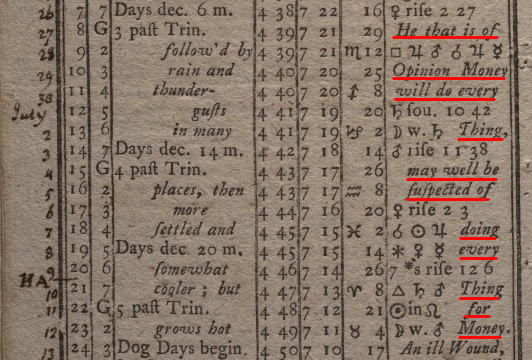Benjamin Franklin? George Savile? Apocryphal? Anonymous
Question for Quote Investigator: A popular technique in rhetoric consists of repeating a clause while permuting the words. For example:
- Money will do everything for you.
- You will do everything for money.
Apparently, statesman Benjamin Franklin contended that a belief in the first clause led individuals to follow the guidance of the second. Would you please explore this topic?
Reply from Quote Investigator: Benjamin Franklin did include a matching statement in one of his famous almanacs, but the saying was already in circulation.
The earliest evidence known to QI appeared in a 1750 volume by the English nobleman George Savile, 1st Marquis of Halifax. The book included a section called “Political, Moral, and Miscellaneous Thoughts and Reflections” that contained items such as the following. The word “everything” was written as two words. Emphasis added to excerpts by QI:1
If Men considered how many Things there are that Riches cannot buy, they would not be so fond of them.
Money in a Fool’s Hand exposeth him worse than a pyed Coat
They who are of opinion that Money will do every thing, may very well be suspected to do every thing for Money.
Savile had died in 1695 many years before publication. A note at the beginning of the manuscript stated that the original document had been held by Savile’s grand-daughter Dorothy, Countess of Burlington.
Below are additional selected citations in chronological order.
In May 1750 Savile’s book was examined in “The Monthly Review” and the saying under analysis was reprinted.2 Thus, it achieved further circulation.
At the end of 1752 Benjamin Franklin published “Poor Richard Improved: Being an Almanack and Ephemeris of the Motions of the Sun and Moon for the Year of Our Lord 1753”. The saying appeared interspersed with the data for July. The phrasing differed a bit from Savile’s statement by using “he” instead of “they”:3
He that is of Opinion Money will do every Thing, may well be suspected of doing every Thing for Money.

Here is an image showing the quotation underlined in red on the 1753 almanac page.
Researchers have found multiple instances of Franklin placing adages into his almanacs that had previously appeared in other reference works. An example of a saying from a 1727 compendium by Thomas Fuller that appeared in a 1738 almanac is given in this website article.
In 1847 an instance with another phrasing appeared without attribution in the “Sunbury American” of Sunbury, Pennsylvania:4
Those who are of opinion that money will do everything, may be reasonably suspected of doing everything for money.
In 1849 the same phrasing appeared in “The Ohio Cultivator”, a periodical based in Columbus, Ohio, and no attribution was specified.5
In 1890 the “Sandusky Daily Register” of Ohio printed an instance that was very close to the version in Franklin’s almanac together with a corresponding attribution:6
He that is of the opinion that money will do everything may well be suspected of doing everything for money.
POOR RICHARD.
In 1942 H. L. Mencken included the saying in his massive reference “A New Dictionary of Quotations on Historical Principles from Ancient and Modern Sources”:7
He that is of opinion money will do everything may well be suspected of doing everything for money.
BENJAMIN FRANKLIN: Poor Richard’s Almanac, 1753
In conclusion, QI believes that George Savile, 1st Marquis of Halifax should receive credit for this saying based on the 1750 citation. Assuming this ascription is accurate one may conclude that Savile wrote the statement before his death in 1695. Benjamin Franklin included the saying in his almanac for 1753, but this occurred after Savile’s posthumous publication.
Acknowledgement: Great thanks to Marian T. Wirth whose inquiry led QI to formulate this question and perform this exploration. Thanks also to the volunteer editors of Wikiquote.
Update History: On April 12, 2025 the format of the bibliographical notes was updated.
- 1750, A Character of King Charles the Second: And Political, Moral, and Miscellaneous Thoughts and Reflections by the George Savile, Marquis of Halifax, Section: Of Money, Start Page 145, Quote Page 145 and 146, Printed for J. and R. Tonson and S. Draper, London. (Google Books Full View) link ↩︎
- 1750 May, The Monthly Review or New Literary Journal by Several Hands, Volume 3, Article 7, (Review of “A Character of K. Charles II” by George Saville, Marquis of Hallifax), Start Page 38, Quote Page 44, Printed for R. Griffiths, London. (Google Books Full View) link ↩︎
- 1753 July, Poor Richard Improved: Being an Almanack and Ephemeris of the Motions of the Sun and Moon for the Year of Our Lord 1753, (Poor Richard’s Almanac), Benjamin Franklin, Month: July, Column: 2, Philadelphia, Pennsylvania. (Images from Historical Society of Pennsylvania; accessed at rarebookroom.org on February 16, 2018) link ↩︎
- 1847 November 6, Sunbury American, (Filler item), Quote Page 4, Column 1, Sunbury, Pennsylvania. (Newspapers_com) ↩︎
- 1849 March 15, The Ohio Cultivator: A Semi-Monthly Journal, Volume 5, Number 6, Domestic Items, Quote Page 95, M. B. Bateham, Columbus, Ohio. (Google Books Full View) link ↩︎
- 1890 December 18, Sandusky Daily Register, Notes and Comments, Quote Page 2, Column 2, Sandusky, Ohio. (Newspapers_com) ↩︎
- 1942, A New Dictionary of Quotations on Historical Principles from Ancient and Modern Sources, Selected and Edited by H. L. Mencken (Henry Louis Mencken), Section: Money, Quote Page 803, Alfred A. Knopf. New York. (Verified on paper) ↩︎